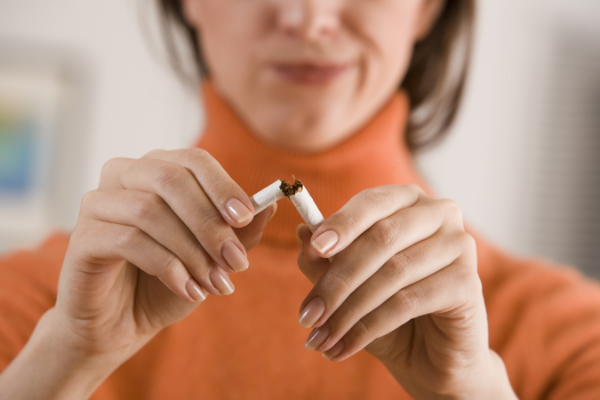Tobacco is the number one most preventable cause of death and disease in the United States. It causes more than 480,000 premature deaths each year. Once a person starts smoking, they develop a dependence, then an addiction and most have an extremely hard time quitting. When a person smokes a cigarette, it takes 10 seconds for the nicotine to reach the brain. Once the nicotine is absorbed into the bloodstream, it causes adrenaline and dopamine to be released in the brain (these are the brain’s feel-good chemicals). Dopamine prompts the brain to continue repeating the same behavior. This is called reinforcement. 
Is Smoking a Physical or Mental Addiction?
If you ask most smokers why they smoke, they will tell you it’s because they enjoy it. Some may say they are stressed out and need it, and some say they just do it because it’s a habit. The majority of people think smoking is physical nicotine addiction, and that’s why it’s so hard to quit. However, 80% of a smoking addiction consists of mental dependence. Only 20% is the physical nicotine addiction. Unfortunately, tobacco companies and nicotine products don’t want you to know this! Smoking is like a program in your brain, a destructive program at that. For many, it has been part of their daily routine for years. They smoke to socialize, relieve stress and anxiety because they are bored, it’s what they do on break at work, it’s refreshing after eating a meal, keeps your hands busy, or may help one concentrate or celebrate. All of these situations are triggers for smoking and put fear into a person trying to quit.
How to Stop Smoking?
There are many ways to quit smoking, but what is the best way? The first thing an individual must do before attempting to quit is to figure out why they want to do this. Having a reason for quitting motivates you and is a powerful way to break the habit once and for all. The second most important thing is to set a date. Once you have your reason and have set your date to quit, the best way to stop is by using a combination of nicotine replacement therapy, medications, and a strong support system. The nicotine replacement therapy helps with cravings, headaches, mood changes, and low energy from nicotine withdrawal. The medications help to reduce the urge and enjoyment of smoking by attaching to the same receptors in the brain that nicotine stimulates. This causes the nicotine to have fewer places to attach, which then reduces the buzz feeling that one gets from smoking.
More About How to Stop Smoking
The last thing that’s vital for smoking cessation is having a strong support system to rely on and help cheer you on when you feel like giving up. Also, since smoking addiction has such a huge mental aspect to it, using therapy like cognitive-behavioral therapy can also be a very effective tool when trying to quit. The American Cancer Society recommends telling your friends and family you are quitting, throwing away all cigarettes and ashtrays, stocking up on oral substitutes like hard candy and gum, and asking anyone that smokes not to smoke around you. There are certain daily activities that may trigger you or give you the urge, but you have to break that association and fight the urge. On your quit day, you should stay busy, do not smoke at all, start using your nicotine replacement therapy, drink plenty of water and juice, drink no alcohol, avoid anyone that smokes, and avoid any situations that would give you a strong urge to smoke.
Call Evoke Wellness for Immediate Entry to Treatment
Evoke Wellness offers a safe and comfortable environment for medical detoxification. Our patients are treated extensively so that minimal discomfort is experienced during the detox process. We provide residential treatment in a structured environment and then provide you with after-care support which is very important when being treated for addiction. Evoke Wellness is here to help you get on the road to long-term recovery.


